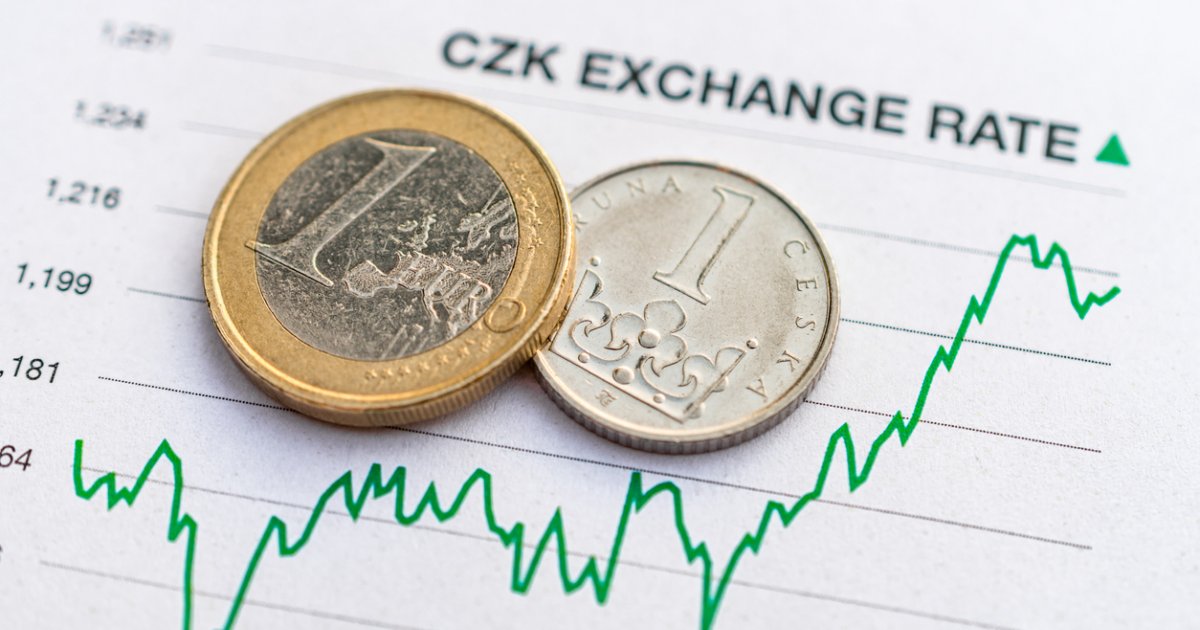In the coming months, the Czech currency should weaken from its current values, which are the strongest against the euro since the crisis year of 2008. It could thus weaken by several tens of pennies from Friday’s 23.90 CZK per euro. This follows from analysts’ estimates. According to them, the strengthening of the koruna in recent weeks was related to the return of risk appetite to more exotic currencies such as the koruna. The higher interest rate of the domestic currency also plays a role.
“The Czech koruna is currently benefiting from a decrease in investors’ concerns about the further development of the global, but especially the European, economy. In such a situation, capital, which until now has been ‘cleaned up’ for preventive reasons in safe havens, such as the US dollar, is looking for application in places which offer a higher return with a higher risk. Among them is the koruna, which remains at a better interest rate than, for example, the dollar or the euro,” said Cyrrus analyst Vít Hradil.
Waiting for an even stronger crown makes no sense. It’s the best time to buy euros, say analysts
At the end of the working week, the Czech currency reached its strongest level against the euro twice in a row since November 2008, even briefly breaking the 23.90 level against the European currency. Even lay people are already thinking whether to buy euros, at least for the summer, or to wait some more time to see if the exchange rate is even more favorable.
The koruna has strengthened in recent weeks mainly due to optimism regarding better developments in Europe, agreed Raiffeisenbank analyst Vratislav Zámiš. He personally considers the current optimism to be exaggerated, when, for example, from the point of view of the interest rate differential, the koruna is now significantly stronger than it should be according to the model. “Therefore, I expect that the koruna may still hover around the 24-koruna mark in the coming weeks. However, in the course of the year, as a more likely scenario, I see a gradual weakening to the limits where the CNB intervened during the summer, i.e. 24.70 to 24.80 CZK per euro,” he added.
According to Hradil, the declared willingness and ability of the Czech National Bank to support it with foreign exchange interventions in the event that it finds itself under pressure again helps the crown. He personally expects that the crown will not maintain its newly conquered position and will weaken again in the near future. He considers an exchange rate close to 24.40 CZK/EUR to be adequate.

Trader’s week: Gas becomes cheaper in Europe, inflation in the US weakens
The euphoria in the markets slowly began to fade. Investors started taking their profits after weeks of gains, despite favorable data on inflation in the supply side of the economy. What did that mean in reality? The American S&P 500 index rebounded from the round target of 4,000 points, which may finally confirm the long-term persistent “bearish” trend in the stock markets.
The strengthening of the koruna probably surprises even the CNB itself, which in its original forecast expected the exchange rate to be above the 25 CZK/EUR level at the end of last year, pointed out Purple Trading analyst Petr Lajsek. He reminded that there have been no foreign exchange interventions since November. He assumes that the koruna will no longer have much room for strengthening and that there will be a gradual reversal of the trend.
“The significant gains achieved by the koruna at the beginning of this year will probably not be sustained and will be corrected by the end of the year, especially in connection with the further narrowing of the interest differential (the difference between the interest rates of the koruna and other currencies),” said Komerční banka analyst Jaromír Gec. Overall, he expects the koruna to weaken to 24.25 CZK/EUR by the end of 2023.
Rates helped
From the point of view of the current situation, according to XTB analyst Jiří Tyleček, the koruna may seem abnormally strong, however, it is significantly helped by high interest rates. After all, this can also be seen in other strengthening currencies in the Central European region. The relative amount of rates and movements in other countries is also important, he pointed out. In the coming weeks, the koruna should remain similarly strong, says Port analyst Marek Pokorný. At the beginning of April, however, it could reach the level of CZK 24.20 per euro. By the end of the year, the price of the euro could approach 25 crowns, he noted.
The koruna traded below CZK 24.00/EUR throughout the week, and the level of CZK 23.90/EUR was tested on Thursday. This year, the crown gained three quarters of a percent. Since the beginning of last year’s final quarter, the koruna has improved by 2.6 percent, said Komerční banka analyst Jan Vejmělek.

The IMF is getting “crossed” with the CNB. He is gambling with the fate of the Czech economy
In its published regular assessment of the Czech economy, the International Monetary Fund (IMF) expects a drop in its economic performance by 0.5 percent in real terms this year. For comparison, the Czech National Bank (ČNB) forecasts a decline in the domestic economy of 0.7 percent for 2023, while the Ministry of Finance expects a decrease in its performance by only 0.2 percent. The inflation estimate provided by the IMF is also roughly “between”, which forecasts for the Czech Republic this year an average annual growth in the level of consumer prices in the Czech Republic of 9.3 percent, while the CNB forecasts 9.1 percent and the Ministry of Finance 9.5 percent.

The IMF is getting “crossed” with the CNB. He is gambling with the fate of the Czech economy
In its published regular assessment of the Czech economy, the International Monetary Fund (IMF) expects a drop in its economic performance by 0.5 percent in real terms this year. For comparison, the Czech National Bank (ČNB) forecasts a decline in the domestic economy of 0.7 percent for 2023, while the Ministry of Finance expects a decrease in its performance by only 0.2 percent. The inflation estimate provided by the IMF is also roughly “between”, which forecasts for the Czech Republic this year an average annual growth in the level of consumer prices in the Czech Republic of 9.3 percent, while the CNB forecasts 9.1 percent and the Ministry of Finance 9.5 percent.
All about inflation
Inflation scarecrow. What causes it? How to defend against her? How to invest, where to save savings, where there are decent interest rates, which bonds are worth it? How do the state, the government and the CNB fight inflation? Who and why increases the price and how much? How to cope with price increases? Is it the right time to get a mortgage, will interest rates rise or fall, and for what reason? Context, tips, hints, warnings.
High inflation troubles not only the Czechia, but also other European countries and the United States. See the overview in the world.


